As a holistic veterinarian, I often get asked about breed-specific health issues, and Brittany Eye Health is a topic that comes up frequently. If you’re a proud parent of a Brittany, you know that these dogs are not only beautiful and intelligent, but also have a unique eye structure that can make them prone to certain eye health issues.
Understanding your Brittany’s eye health is crucial to ensure they live a happy, healthy life. From the specific structure of their eyes, to common eye issues, and preventative measures, it’s important to arm yourself with the right knowledge.
Whether you’re searching for “Brittany Eye Care Services”, or you’re keen on learning about “Eye Health Treatments in Brittany”, this article has you covered. We’ll even discuss the role of environmental hygiene and routine care in maintaining your Brittany’s eye health.
Remember, keeping an eye on your Brittany’s eyes is not just about spotting problems. It’s also about preventing them. And with the right care, you can ensure that your Brittany’s eyes stay as bright and lively as their personality.
So, let’s discuss the fascinating world of Brittany Eye Health and discover how you can keep those beautiful eyes in top condition.
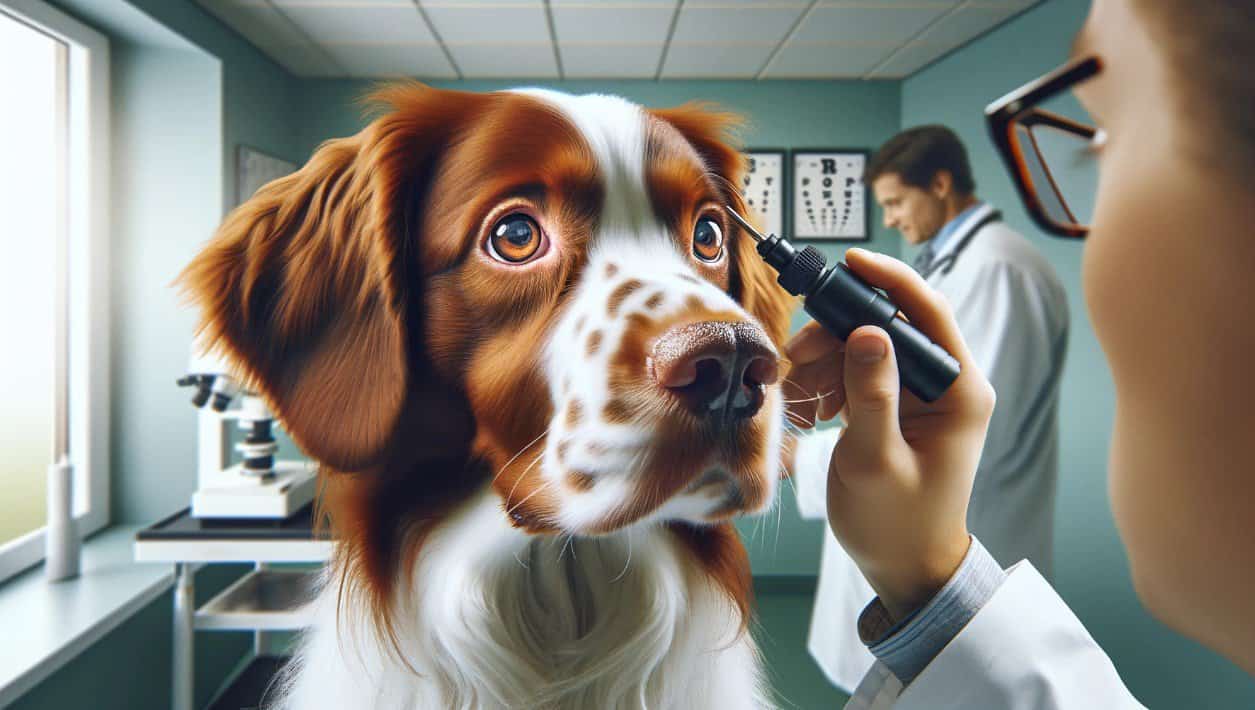
Understanding Breed Specific Eye Structure
As a holistic vet, I know that understanding the unique eye structure of your Brittany is the first step to ensuring their optimal eye health. The Brittany breed, named for the French region they hail from, has a distinctive set of peepers that require specific care and attention. So, let’s dive into the fascinating world of Brittany eye health!
Brittanys have medium-sized eyes that are set well into their heads, with the upper lids shaped like almonds. They are usually dark brown or hazel, giving them a warm, intelligent expression. The breed standard calls for eyes that are neither too deep-set nor too protruding. It’s this unique structure that contributes to their keen vision, but also predisposes them to certain eye conditions.
One of the most distinctive characteristics of the Brittany’s eyes is the presence of a third eyelid, also known as the nictitating membrane. This extra layer of protection helps keep their eyes moist and free from debris while they’re out in the field. However, it can sometimes become inflamed or infected, leading to a condition known as ‘cherry eye’.
Another important aspect of Brittany eye structure is their tear duct system. Brittanys have a well-developed lacrimal system that produces tears to keep their eyes lubricated. However, this system can sometimes become blocked, leading to dry eyes or excessive tearing.
The eyelashes of Brittany dogs are also an important part of their eye structure. These dogs have long, thick lashes that help protect their eyes from dust and debris. However, these beautiful lashes can sometimes grow inwards, causing irritation and discomfort.
Understanding these unique characteristics of Brittany’s eyes will empower you to better monitor their eye health and spot any potential problems early. Remember, regular eye exams by a vet specializing in Brittany eye health are crucial to ensuring your furry friend’s eyes remain in top shape. So, let’s keep those beautiful Brittany eyes healthy and bright!
Common Eye Issues In Brittany
As a veterinarian, I’ve seen a variety of eye health issues in Brittanys. This breed is generally healthy, but certain eye conditions can affect them. Understanding these conditions and taking steps to prevent them is critical in maintaining your Brittany’s eye health.
One common eye issue in Brittanys is Progressive Retinal Atrophy (PRA). This is a genetic disorder that can lead to blindness. Brittany Eye Health becomes a concern as the disease progressively worsens, affecting the retina’s ability to process light. Symptoms can include night blindness and dilated pupils.
Another concern is Cataracts. Just like in humans, cataracts in Brittanys can cause cloudiness in the lens of the eye, leading to impaired vision. This could eventually result in blindness if left untreated.
Brittanys are also prone to Cherry Eye. This condition occurs when the gland in the third eyelid prolapses and becomes visible. It might not be life-threatening but can cause discomfort and inflammation if not treated.
Lastly, Distichiasis is a condition where an extra row of eyelashes grows on the inner edge of the eye, causing irritation and potential damage to the cornea.
Here’s a quick glance at these common Brittany eye issues:
| Condition | Symptoms | Potential Impact |
|---|---|---|
| Progressive Retinal Atrophy (PRA) | Night blindness, dilated pupils | Can lead to blindness |
| Cataracts | Cloudiness in the lens of the eye | Can lead to impaired vision or blindness |
| Cherry Eye | Visible gland in the third eyelid | Can cause discomfort and inflammation |
| Distichiasis | Extra row of eyelashes on the inner edge of the eye | Can cause irritation and potential cornea damage |
Remember, early detection is key in managing these conditions. Regular check-ups with Brittany Eye Health Specialists can help detect these issues early, and appropriate treatments can prevent them from worsening. As a responsible Brittany parent, being aware of these common eye issues is the first step towards ensuring a healthy and happy life for your beloved pet.
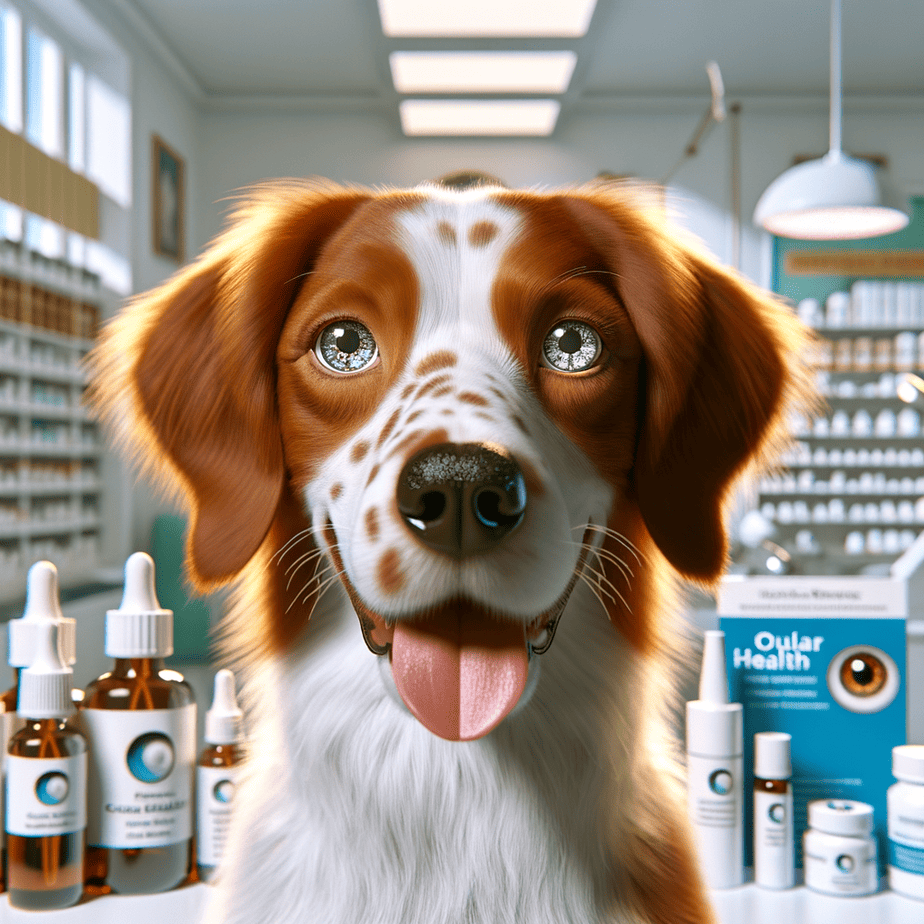
Nourishing Your Brittany’s Vision: Essential Nutrients for Eye Health
Ensuring your Brittany gets the right nutrients for optimal eye health is essential for maintaining clear vision and preventing age-related issues. Natural, nutrient-rich foods and supplements can play a key role in supporting their eyesight. From vitamin A-packed freeze-dried liver treats to antioxidant-rich blueberries and targeted supplements like Eyeplex by Standard Process, there are several ways to nourish your dog’s eyes. In this section, we’ll explore how these powerful ingredients contribute to long-term vision health and overall well-being.
Eyeplex by Standard Process
Eyeplex by Standard Process is a specialized supplement designed to support your Brittany’s eye health with a blend of essential nutrients. Formulated with key vitamins, minerals, and antioxidants, Eyeplex helps protect against oxidative stress, supports retinal function, and promotes overall vision health. Ingredients like vitamin A, vitamin C, and zinc contribute to maintaining strong eyesight, while whole food ingredients provide additional phytonutrients for cellular protection. Adding Eyeplex to your Brittany’s diet can be especially beneficial for aging dogs or breeds prone to eye conditions, offering targeted nutritional support to keep their vision sharp and healthy for years to come.
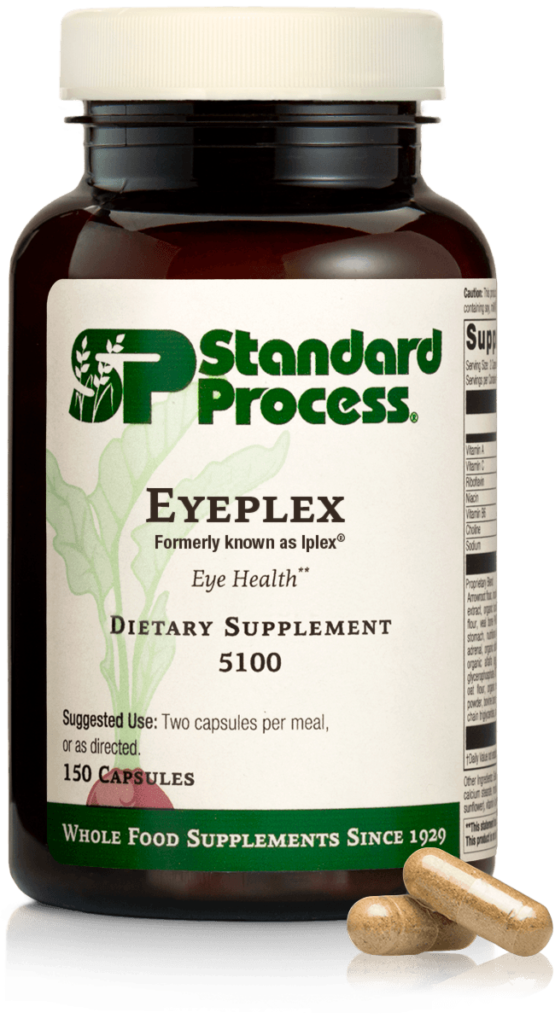
Freeze-Dried Blueberries
Freeze-dried blueberries are a powerhouse of antioxidants that can help protect your Brittany’s eyes from oxidative stress and age-related damage. Rich in vitamins C and E, as well as anthocyanins, these tiny but mighty berries help combat free radicals that can contribute to eye diseases like cataracts and macular degeneration. Incorporating freeze-dried blueberries into your dog’s diet provides a natural and delicious way to support retinal health, reduce inflammation, and promote overall vision longevity. Plus, they’re a low-calorie, dog-friendly treat that makes a great addition to a balanced diet for long-term eye health.
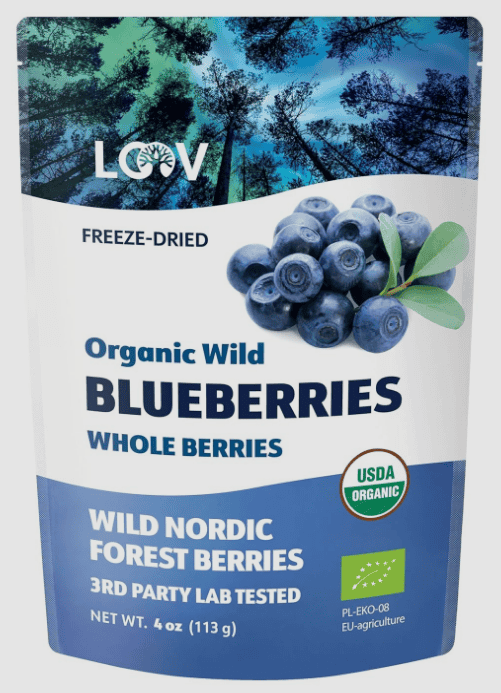
Freeze-Dried Liver
Freeze-dried liver treats are an excellent natural source of vitamin A, an essential nutrient for your Brittany’s eye health. Vitamin A plays a crucial role in maintaining good vision, especially in low-light conditions, while also supporting overall immune function and skin health. Since liver is rich in bioavailable vitamin A, incorporating freeze-dried liver treats into your dog’s diet provides a convenient and nutritious way to promote optimal eye function. Just be sure to feed them in moderation, as excessive vitamin A can lead to toxicity. Adding these nutrient-packed treats to your pup’s routine is a simple, tasty way to support their long-term vision and well-being!

Proper Hygiene and Regular Check-ups
Good hygiene practices and regular vet check-ups are also essential for maintaining your Brittany’s eye health. Regular grooming can help prevent eye infections by keeping the area around the eyes clean and free from dirt and debris. Regular vet visits can help detect any potential eye issues early and provide appropriate treatment.
Remember, the health of your Brittany’s eyes is just as important as their overall health. By implementing these prevention strategies, you can help ensure your Brittany’s eyes stay healthy and vibrant for years to come.
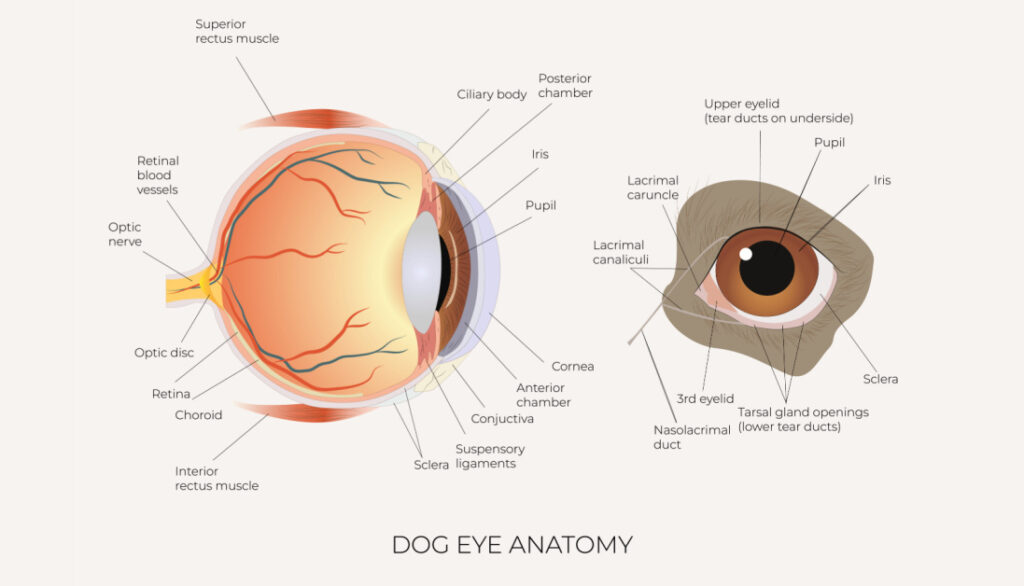
Environmental Hygiene to Reduce Eye Problems
Just like us, our dogs’ health is influenced by the environment they live in. Ensuring a clean and safe environment is crucial for maintaining the eye health of your Brittany. Here are some of the ways you can improve environmental hygiene to reduce eye problems for your beloved pet.
Indoor Air Quality
Indoor air quality plays a significant role in Brittany Eye Health. Dogs are sensitive to dust, smoke, and other airborne irritants, which can cause eye irritation, allergies, and infections. Therefore, maintaining good air quality inside your home is essential.
- Ensure your home is well-ventilated and free of smoke and dust. Regular cleaning can help in reducing dust accumulation.
- Consider using an air purifier, especially if someone in the house smokes or if you live in a polluted area.
- Avoid using harsh cleaning products that can release harmful fumes. Opt for pet-friendly, non-toxic cleaning products.
Sprays, Diffusers, Candles, Incense
Many of us love to use sprays, diffusers, candles, and incense to keep our homes smelling fresh. However, these can be harmful to your Brittany’s eyes. The chemicals and fragrances in these products can cause eye irritation and allergies.
- Avoid using these products in areas where your dog spends most of their time. If you must use them, ensure your dog is in a different room and the area is well-ventilated.
- Choose unscented candles or those made with natural ingredients like beeswax or soy. These are less likely to irritate your dog’s eyes.
- Consider using essential oil diffusers with caution. Some essential oils are safe for dogs, but others can be harmful. Always research before using a new oil and keep the diffuser out of your dog’s reach.
Remember, your Brittany’s eyes are delicate and sensitive. By maintaining a clean, safe, and healthy environment, you can help prevent many common eye problems and ensure your dog’s eyes stay bright and healthy. Always monitor your dog for any signs of eye discomfort, and consult with a vet if you notice any changes in their eyes.
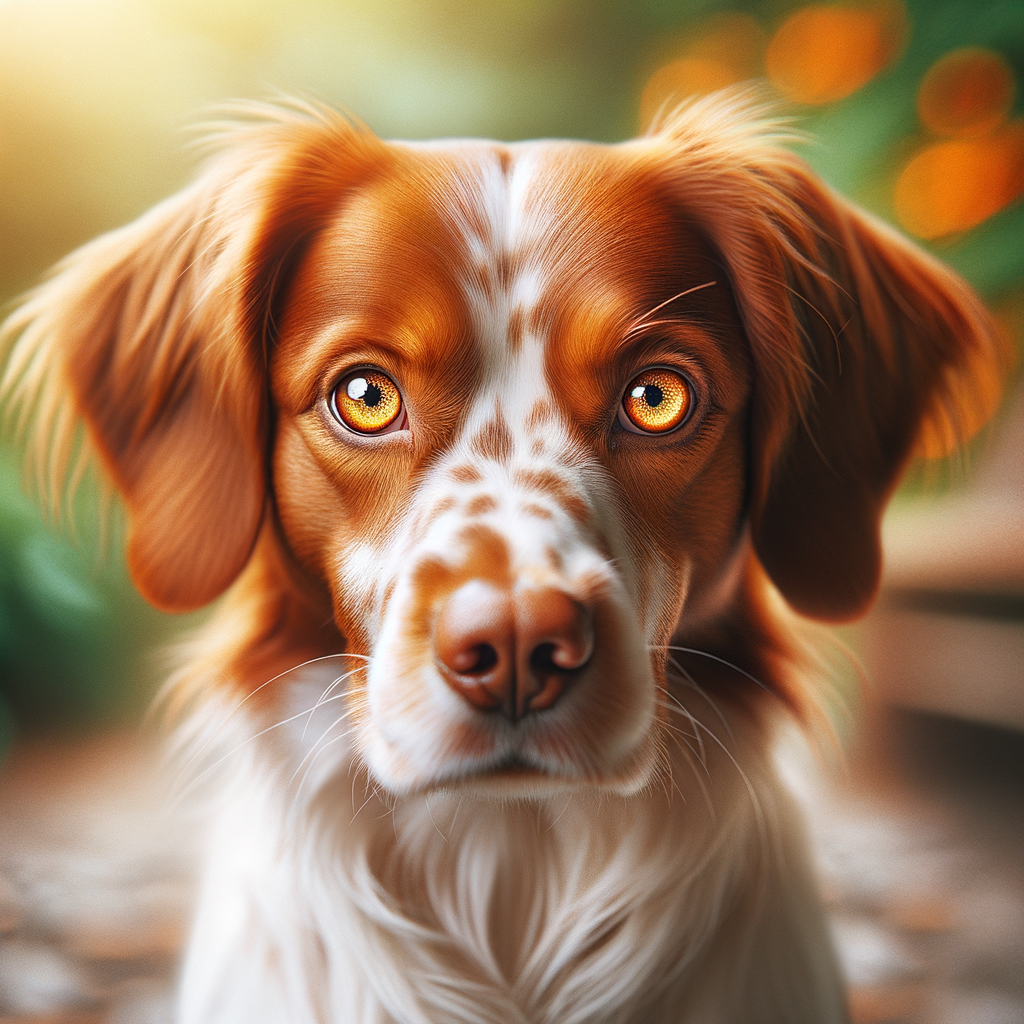
When it comes to Brittany Eye Health, regular care and maintenance is just as important as prevention. As a responsible dog parent, you can do a lot to keep your Brittany’s eyes healthy. Let’s delve into the daily and weekly routines you can adopt, and also discuss the importance of monitoring certain aspects of your Brittany’s grooming regimen.
Daily and Weekly Care & Maintenance
Every day, take a moment to observe your Brittany’s eyes. They should be clear, bright, and free of discharge. If you notice any redness, swelling, or excessive tearing, it’s time to consult an Eye Health Specialist. Remember, early detection is key in addressing Common Eye Issues in Brittany.
Weekly, take a damp, soft cloth and gently wipe around your Brittany’s eyes to remove any dirt or buildup. Do not touch the eye surface. This simple routine can prevent many potential eye issues.
Monitoring Hair and Nail Length
A Brittany’s hair and nails can indirectly affect their eye health. Long hair can irritate the eyes, causing them to tear up and potentially leading to infection. Regularly trim the hair around your Brittany’s eyes, ensuring it doesn’t interfere with their vision or irritate their eyes.
Long nails can scratch the eye surface during grooming or play, causing painful injuries that may require Eye Health Treatments in Brittany. Regular nail trims are essential to prevent such incidents.
Bath Frequency
While keeping your Brittany clean is essential for overall health, bathing too frequently can dry out their skin and hair, including the hair around their eyes. This could lead to irritation and inflammation. A good rule of thumb is to bathe your Brittany every 6-8 weeks, unless they get dirty or smelly in between. Always use a mild, dog-safe shampoo and avoid getting it in their eyes.
By incorporating these routines into your Brittany care regimen, you can significantly contribute to your dog’s eye health. Always remember, though, that even with the best care, eye issues can still occur. Regular check-ups with Brittany Eye Care Services or an Eye Health Specialist in Brittany are essential to ensure optimal eye health. They can provide comprehensive vision care, including regular eye exams and treatment for any emerging issues.
Remember, your Brittany’s eyes are the window to their world. Let’s do our best to keep that view clear and healthy!
Frequently Asked Questions
1. What are some common eye conditions in Brittanys?
Brittanys can be prone to various eye conditions such as cataracts, progressive retinal atrophy (PRA), entropion, and dry eye.
2. How can I recognize if my Brittany has an eye problem?
Watch out for symptoms like redness, excessive tearing, squinting, cloudiness, discharge, or changes in behavior related to eyesight. If you notice any of these signs, it’s best to consult a veterinarian.
3. Can eye conditions in Brittanys be treated?
Yes, many eye conditions in Brittanys can be treated or managed with proper veterinary care. Treatment options may include medications, surgery, or specialized eye drops.
4. How can I prevent eye problems in my Brittany?
Regular eye examinations by a veterinarian are crucial for early detection and prevention of eye problems. Additionally, keeping your Brittany’s eyes clean, avoiding exposure to irritants, and providing a balanced diet can help maintain good eye health.
5. Should I be concerned about my Brittany’s eye discharge?
Some amount of clear or slightly white discharge is normal in dogs. However, if the discharge is excessive, discolored, or accompanied by other symptoms, it may indicate an underlying eye problem. It’s advisable to consult a veterinarian for proper evaluation.
